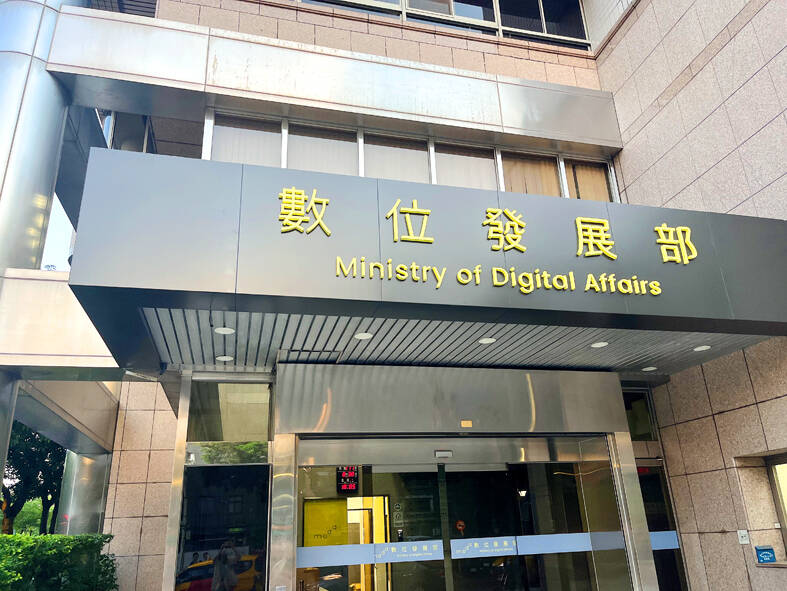Taiwan is to partner with satellite provider SES of Luxembourg on a project aimed at improving the resiliency of the nation’s digital communications networks, the Ministry of Digital Affairs said on Wednesday.
SES, an operator of geostationary and medium Earth orbit (MEO) satellites, has been confirmed as a cooperation partner for the project, which includes the establishment of 773 satellite terminals at home and abroad by the end of next year, the ministry said.
To bolster the nation’s digital infrastructure, the ministry earlier this year rolled out a program for the digital resilience validation of emerging technologies for contingency or wartime applications, which aims to confirm the feasibility of using a nonsynchronous satellite network as an emergency backup network.

Photo: Taipei Times
The Telecom Technology Center was selected to lead the execution of the project, which the ministry said aims to ensure the reliable transmission of critical commands and emergency evacuation information during urgent situations.
The program mainly relies on low Earth orbit (LEO) satellites to maintain Internet connectivity in the event of an emergency, but if LEO satellites are not available, they could be replaced by MEO satellites, the ministry said.
Under the project, it is hoped that each terminal can be connected to more than two satellites, it added.
SES is the second satellite operator to be linked to Taiwan’s digital resilience project, after UK-based OneWeb.
Following a visit to OneWeb’s London headquarters in June, Minister of Digital Affairs Audrey Tang (唐鳳) said she learned that the firm was “more than willing” to participate in the project.
Synchronous, LEO and MEO satellite communication companies are all welcome to participate in the project, provided they comply with Taiwan’s national security and information security regulations, the ministry said.

INVESTIGATION: The case is the latest instance of a DPP figure being implicated in an espionage network accused of allegedly leaking information to Chinese intelligence Democratic Progressive Party (DPP) member Ho Jen-chieh (何仁傑) was detained and held incommunicado yesterday on suspicion of spying for China during his tenure as assistant to then-minister of foreign affairs Joseph Wu (吳釗燮). The Taipei District Prosecutors’ Office said Ho was implicated during its investigation into alleged spying activities by former Presidential Office consultant Wu Shang-yu (吳尚雨). Prosecutors said there is reason to believe Ho breached the National Security Act (國家安全法) by leaking classified Ministry of Foreign Affairs information to Chinese intelligence. Following interrogation, prosecutors petitioned the Taipei District Court to detain Ho, citing concerns over potential collusion or tampering of evidence. The

‘FORM OF PROTEST’: The German Institute Taipei said it was ‘shocked’ to see Nazi symbolism used in connection with political aims as it condemned the incident Sung Chien-liang (宋建樑), who led efforts to recall Democratic Progressive Party (DPP) Legislator Lee Kun-cheng (李坤城), was released on bail of NT$80,000 yesterday amid an outcry over a Nazi armband he wore to questioning the night before. Sung arrived at the New Taipei City District Prosecutors’ Office for questioning in a recall petition forgery case on Tuesday night wearing a red armband bearing a swastika, carrying a copy of Adolf Hitler’s Mein Kampf and giving a Nazi salute. Sung left the building at 1:15am without the armband and apparently covering the book with a coat. This is a serious international scandal and Chinese

Seventy percent of middle and elementary schools now conduct English classes entirely in English, the Ministry of Education said, as it encourages schools nationwide to adopt this practice Minister of Education (MOE) Cheng Ying-yao (鄭英耀) is scheduled to present a report on the government’s bilingual education policy to the Legislative Yuan’s Education and Culture Committee today. The report would outline strategies aimed at expanding access to education, reducing regional disparities and improving talent cultivation. Implementation of bilingual education policies has varied across local governments, occasionally drawing public criticism. For example, some schools have required teachers of non-English subjects to pass English proficiency

TRADE: The premier pledged safeguards on ‘Made in Taiwan’ labeling, anti-dumping measures and stricter export controls to strengthen its position in trade talks Products labeled “made in Taiwan” must be genuinely made in Taiwan, Premier Cho Jung-tai (卓榮泰) said yesterday, vowing to enforce strict safeguards against “origin laundering” and initiate anti-dumping investigations to prevent China dumping its products in Taiwan. Cho made the remarks in a discussion session with representatives from industries in Kaohsiung. In response to the US government’s recent announcement of “reciprocal” tariffs on its trading partners, President William Lai (賴清德) and Cho last week began a series of consultations with industry leaders nationwide to gather feedback and address concerns. Taiwanese and US officials held a videoconference on Friday evening to discuss the